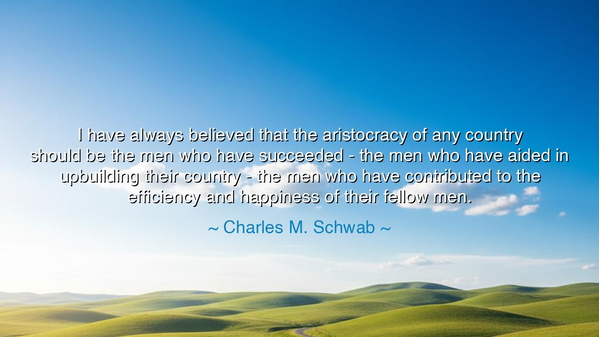
I have always believed that the aristocracy of any country should
I have always believed that the aristocracy of any country should be the men who have succeeded - the men who have aided in upbuilding their country - the men who have contributed to the efficiency and happiness of their fellow men.






Hear now the words of Charles M. Schwab, a titan of steel and of vision, who once declared: “I have always believed that the aristocracy of any country should be the men who have succeeded — the men who have aided in upbuilding their country — the men who have contributed to the efficiency and happiness of their fellow men.” These words burn with the fire of merit and the dignity of labor. They remind us that true nobility does not flow through bloodlines, but through deeds; it is not conferred by inheritance, but by achievement in service to others. Schwab, who rose from humble beginnings to become one of the great builders of America’s industrial age, spoke not as one born to privilege, but as one who forged his place in the world through vision, courage, and toil.
In the ancient world, the word aristocracy meant “the rule of the best” — not the richest, not the most famous, but the most excellent, those whose strength and wisdom uplifted the community. Yet over time, nobility decayed into pride, and inheritance replaced honor. Schwab’s words were a call to return to the original spirit of the word — to measure greatness not by lineage but by contribution, not by what a man possesses, but by what he gives. To him, the true aristocrat was not the idle lord, but the builder, the innovator, the servant-leader whose hands and mind enriched the life of the nation.
Schwab’s own life was a testament to this belief. Born to a poor family in Pennsylvania, he began as a stake driver in Andrew Carnegie’s steelworks and rose, by ability and character, to become president of the Carnegie Steel Company and later founder of Bethlehem Steel. His rise was not a miracle, but the natural fruit of his philosophy — that greatness belongs to those who create, who improve, who serve. He saw the factory floor not as a place of servitude, but as the heart of progress. The men who built bridges, who forged steel, who toiled to strengthen their country — these were, in his eyes, the aristocrats of the new age.
Let us remember, too, that in every era, civilizations have been measured by those who build rather than those who merely rule. When Pericles led Athens, he surrounded himself not with nobles of birth, but with craftsmen, architects, and thinkers — the men who gave Greece its Parthenon and its glory. When Abraham Lincoln, born in a log cabin, guided his nation through war, he proved that the highest nobility is the nobility of purpose. The true aristocracy Schwab envisioned is one of service and virtue, a brotherhood of the capable and the compassionate — those who lift others by lifting themselves.
Yet this truth, simple though it is, has always been hard for humankind to remember. Too often do men mistake wealth for worth, and title for talent. Schwab’s voice rises like an admonition through the centuries: greatness is not measured by possession, but by contribution. The idle rich, the self-absorbed, the indifferent — they are but shadows beside those who build schools, industries, or ideas that enrich the world. The world’s true aristocrats are its creators, teachers, and visionaries, whose efforts leave the world stronger than they found it.
There is a sacred challenge hidden in these words. Each of us, no matter how small our station, is called to join this higher aristocracy — to become a servant of the greater good. A farmer who tends his soil with care, a mother who raises her children with wisdom, a worker who takes pride in his craft — these too are the builders of a nation’s soul. Success, in Schwab’s vision, was not the victory of one man over another, but the triumph of humanity working together for the common good.
Let this then be the lesson: do not seek greatness in the gaze of others, but in the quiet work that makes life better for all. Measure your worth not by what you own, but by what you build, what you teach, what you inspire. To live honorably, to labor faithfully, to uplift one’s community — this is the path to true nobility. Let every man and woman strive to become part of that living aristocracy — not of titles or thrones, but of spirit and service.
For in the end, when the banners of empire have faded and the marble palaces have crumbled, only the works of the righteous and the devoted endure. The bridges that unite, the schools that enlighten, the hearts that are lifted — these are the monuments of the true aristocrats of humanity. So live, then, not to be admired, but to be useful. Build, give, create — and in doing so, you shall belong to the only nobility that time cannot destroy.






AAdministratorAdministrator
Welcome, honored guests. Please leave a comment, we will respond soon